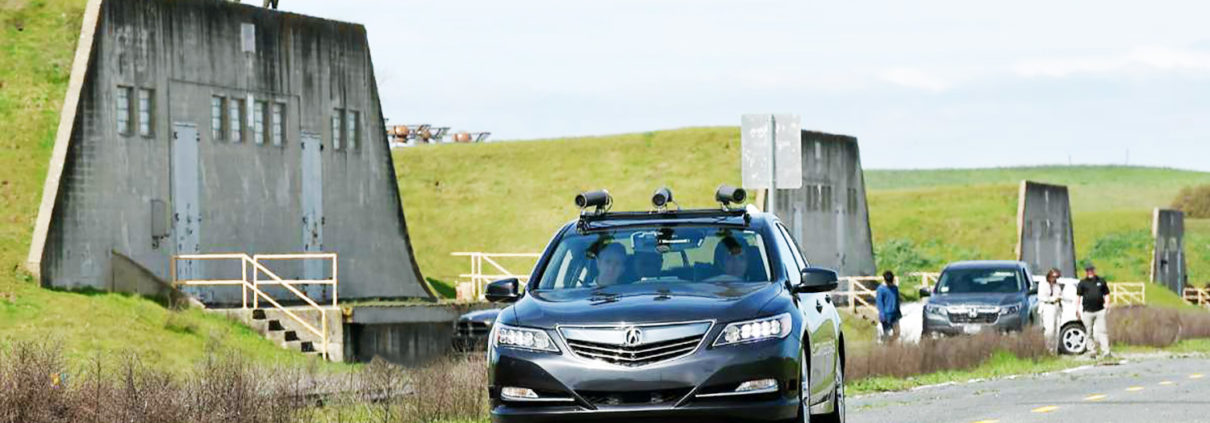Special Recognition: CCTA: GoMentum Station and Shared Autonomous Mobility
GOMENTUM STATION & SHARED AUTONOMOUS VEHICLES
by Randell H. Iwasaki & Contra Costa County – Planning
CCTA
Founded in 2014, GoMentum Station is a 5,000-acre miniature “city,” a partnership between the Contra Costa Transportation Authority (CCTA) and the City of Concord, to repurpose the decommissioned Concord Naval Weapons Station as a site for testing autonomous and connected vehicles and smart infrastructure, including hands-off-wheel, feet-off-pedal capabilities; smart cars that communicate with each other and their surroundings; and driverless, shared electric autonomous vehicles. At GoMentum Station, CCTA partners with infrastructure owners/operators, local jurisdictions and transit agencies, vehicle manufacturers, in-vehicle and roadside equipment vendors, technology companies, and academia to study infrastructure, connected vehicles, autonomous vehicles, and other innovative applications.
Recently acquired by AAA of Northern California, Nevada & Utah, GoMentum Station gives partners space to test new technology in a setting that includes:
- 20 miles of roadway with a wide array of pavement textures, from the recently refinished to 40-year old pavement and striping;
- The infrastructure of a typical city—buildings, parking lots, stop signs, sidewalks, curbs, gutters, and striping—plus more complex elements such as bridges, undercrossings, railroad crossings, cattle guards, profile and elevation changes, and curvilinear alignment.
- A large grid of streets with sections striped according to US standards and, in the future, according to European and Asian standards.
- Long straightaways to test at high speeds.
- Twin-bore 1,400-foot long tunnels—with diameters of 14 feet, 3 inches—cut through a hillside to test in a scenario that lacks GPS reception.
In 2016, the California State Legislature passed Assembly Bill 1592 to allow CCTA to pilot a program to integrate electric autonomous, shared shuttles with public transit. The shuttle was tested at GoMentum Station. The shuttle selected for the pilot is manufactured in France by EasyMile. CCTA was the first agency to bring it to North America, going through the U.S. Department of Transportation’s National Highway Traffic Safety Administration (NHTSA) process to obtain a waiver from the Federal Motor Vehicle Safety Standards—required because the vehicle was not made by a traditional automobile manufacturer, and was heavier than a golf cart—to test the vehicle on public roads.
After successful testing at GoMentum Station and in parking lots at Bishop Ranch Business Park in San Ramon, California, CCTA advanced to testing on public streets, which required permission from NHTSA and the California Department of Motor Vehicles. Permission was granted in early 2018, and by March the EasyMile shuttle was traveling public streets within the Bishop Ranch business park. It marked the first time the California Department of Motor Vehicles allowed a shared autonomous vehicle to travel on public roads in the state. Zero-emission, low-speed autonomous shuttles have the potential to ease congestion, reduce emissions, and provide access to transportation hubs throughout Contra Costa County.
CCTA’s vision is for the shuttles to serve as a complement to existing public transit infrastructure, not as a replacement. In surveys, county residents say they want to use public transit, but often do not because the bus stop is too far from their house, or by the time they arrive at the train station the parking lot is full. CCTA can eliminate those barriers by deploying automated shuttles to provide Mobility-on-Demand for first-and-last mile trips to transit.
2019 Better Government Comp… by Pioneer Institute on Scribd




Leave a Reply
Want to join the discussion?Feel free to contribute!